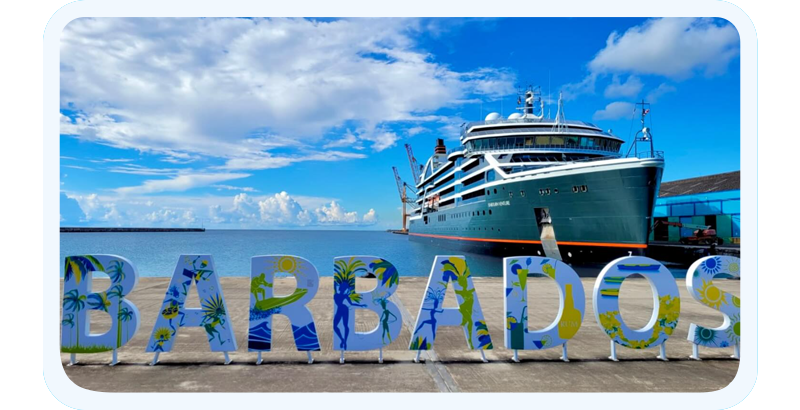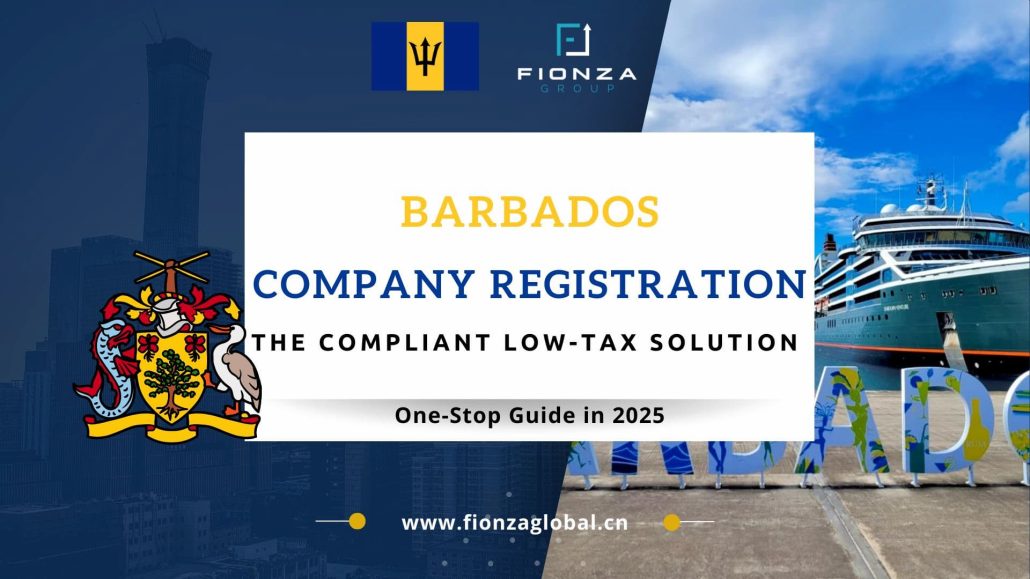When people think of the Caribbean, they often picture a resort paradise with blue seas and skies. Barbados is a quiet, yet increasingly popular, gem in this region. Although small, the country has a stable political system, a Common Law legal framework, and tax reforms that align with the OECD. As a result, it has gradually shifted from a traditional offshore location to a globally recognized, “compliant” hub for Barbados company registration. This attracts many businesses seeking a balance between tax optimization and international compliance.
In recent years, as offshore financial regulations have tightened and traditional jurisdictions like BVI have increased information transparency, Barbados company registration has become a popular choice for a new wave of “compliant international structures.” Its appeal stems from a low effective tax rate (with a maximum of 5.5%), tax treaties with countries like China, the US, and Canada, and the privacy of not having to publicly disclose corporate financial statements.

In addition to its policy advantages, Barbados offers an excellent business and living environment. It is one of the most developed countries in the Caribbean, with the region’s number one ranking for broadband internet. Its education and healthcare standards are top-ranked in the UN’s Human Development Index. It is one of the very few countries where you can both register a company and live comfortably. For Chinese companies seeking to protect family assets, set up international holding structures, expand cross-border e-commerce, or run digital services, Barbados company registration offers both institutional security and operational convenience.
Among Fionza’s past clients, we’ve had many projects that used Barbados to optimize holdings, repatriate profits, legally reduce taxes, and balance CRS arrangements. Consequently, more and more companies are seeing it as a new strategic registration location to replace popular offshore sites like the Cayman Islands and BVI.
Geographic Advantage and Global Access: Why Choose Barbados for Your Company?
In an evolving global landscape, a country’s geographical location affects not only its shipping and communication convenience but also its strategic position in international tax, trade, and investment arrangements.
Barbados sits at a unique crossroads—east of Europe, west of North America, and south of Latin America. As a “gateway” connecting the American continent and the Caribbean, it has a natural geopolitical advantage for global business expansion and multi-location holding structures. For Chinese companies in particular, using Barbados as a channel to the US and Canada helps with fund allocation and provides a legal and efficient foothold for building a compliant chain of US business operations.
Furthermore, Barbados is the only Caribbean island to have signed comprehensive tax treaties with major economies like China, Canada, the UK, and Switzerland. This gives it a policy synergy that other traditional offshore locations lack for avoiding double taxation and legally repatriating profits. This explains why many holding structures originally in Seychelles and BVI have begun to migrate to or add entities in Barbados in recent years.
From an institutional perspective, Barbados is a member of the Commonwealth and operates under a Common Law system with an independent judiciary and transparent legislation. This ensures high predictability for setting up holding companies, family trusts, and resolving cross-border disputes. Moreover, English is the official language, which makes business communication and legal compliance much easier.
Because of this, many clients who consult with Fionza about building a “compliant + low-tax + repatriable” international framework often view Barbados as a key hub. It is especially suitable for setting up holding platforms, profit-sharing entities, or entities that benefit from tax treaties. Barbados company registration is a key step in this process.
Tax Mechanisms: A Compliant Low-Tax Solution for Businesses
“Low-tax” and “tax haven” may sound similar, but they are worlds apart. In the age of global anti-tax avoidance led by the OECD’s BEPS Action Plan, jurisdictions with true sustainable advantages are no longer secret, zero-tax havens. Instead, they are “substantive low-tax” areas like Barbados, which offer transparent tax rates, extensive treaties, and a good international reputation.
1. Unified Corporate Income Tax, Compliant and Transparent
Since 2021, Barbados has abolished the tax distinction between international and local companies. It now has a single corporate tax policy:
-
Companies with an annual profit under BDS$1,000,000 have a 5.5% corporate income tax.
-
The higher the annual profit, the lower the tax rate, which can drop to as low as 1% (for profits over BDS$30,000,000).
This structure not only aligns with the OECD BEPS (Base Erosion and Profit Shifting) Action Plan, but also offers multinational corporations a clear and predictable tax system.
2. Non-Resident Investment-Friendly Policies
-
No capital gains tax: No tax on the sale of overseas assets.
-
No dividend withholding tax: Freely distribute shareholder dividends.
-
No foreign exchange transfer restrictions: Funds can be freely remitted in and out without approval.
These policies are especially favored by digital service exporters, holding platforms, and wealth management institutions.
3. Extensive Tax Treaty Network to Legally Avoid Double Taxation
Barbados has signed Double Taxation Agreements (DTAs) with over 40 countries, including major trading and capital flow nations like China, the US, Canada, Singapore, and the UK. This means that with a well-designed holding structure, companies can achieve reasonable tax optimization and compliant profit repatriation in the parent company’s home country.
Barbados Company Types for Your Business
Registering a company in Barbados is not a one-size-fits-all process. Different legal structures have different tax reporting obligations, compliance requirements, and suitability for various operational scenarios. Choosing the right structure for your company’s purpose—such as holdings, brand ownership, import/export, or fund allocation—will directly affect future compliance costs and operational efficiency.
1. Regular Barbados Company (RBC)
Best for: Local business operations and companies with ties to the Caribbean/Latin America.
-
Requires a local director and registered office.
-
No minimum capital requirement.
-
Subject to the standard corporate income tax rates (1%-5.5%).
-
Standard annual and financial reporting requirements apply.
These companies are typically used for actual business operations and trade with the local or neighboring countries.
2. Society with Restricted Liability (SRL)
Best for: Flexible structures and high-risk isolation needs for investment and service businesses.
-
Similar to a US LLC, suitable for partnership operations and profit distribution.
-
Only needs one shareholder and one director, who can be a non-resident.
-
Can choose to be a tax resident or non-resident (allowing for some planning flexibility).
-
An audit is required if annual revenue/assets exceed BDS$500,000.
Because of its “pass-through entity” nature, the SRL structure is popular with some tax residents in Europe and the US.
3. International Business Company (IBC)
Best for: Holding, service, and brand/IP ownership companies that serve overseas clients.
-
Business must be conducted entirely outside of Barbados.
-
No local director required, allows for 100% foreign ownership.
-
Can apply for an International Business License (IB Licence) to receive special benefits.
-
Enjoys international company benefits like repatriation exemption, low tax rates, and no capital tax.
-
An annual audit is mandatory above a certain threshold.
This structure is the most widely used by Fionza’s clients, especially for digital services, SaaS, global holdings, and profit repatriation designs.
4. International SRL (ISRL)
Best for: Companies that want the flexibility of an SRL but only conduct international business.
-
Must apply for an International SRL License, and cannot transact with Barbados residents or own land.
-
Receives similar international benefits to an IBC.
-
Suitable for asset management, family trusts, and digital finance projects.
How to Choose the Best Structure for Barbados Company Registration?
Your choice of structure should depend on your specific use case. Before you set up, consider these points:
-
Is the company for holding assets or brands, or for operations and settlement?
-
Do you plan to apply for financial or other regulatory licenses in the future?
-
Does your expected annual revenue and cross-border settlement path require you to avoid high compliance costs?
Based on years of practical experience, the Fionza team has provided custom Barbados company registration and physical setup for cross-border e-commerce groups, digital asset institutions, and family offices, maximizing tax transparency and cost efficiency.
Barbados Registration Process and Required Documents
Global company registration is increasingly focusing on compliance and digitalization. Barbados offers a straightforward registration process that can be done remotely and supports a 100% foreign-owned structure. This makes it an excellent choice for cross-border holding structures, remote operational companies, or asset protection projects.
※ The registration process has five key stages:
1. Company Name Approval
Your registration agent will submit a name search and reservation application to the Corporate Affairs and Intellectual Property Office (CAIPO). This typically takes 1–2 business days.
2. Document Preparation
Key documents include:
-
KYC documents (passport + proof of address) for all directors, shareholders, and Ultimate Beneficial Owners (UBOs);
-
A description of the intended business (can cover holdings, services, trade, software, etc.);
-
Company’s Memorandum & Articles of Association;
-
Proof of Barbados registered address and the appointment of a statutory secretary.
For IBC or ISRL structures, you will also need to prepare a license application statement and related declarations.
3. Document Submission and Barbados company registration
Once the documents are ready, they are submitted to CAIPO to complete formal registration. This process takes an average of 3–5 business days. After registration, you will receive these core documents:
-
Certificate of Incorporation
-
Company’s Articles of Incorporation
-
Register of Directors & Shareholders
4. Tax ID Application (TAMIS)
Company formation requires you to register for a tax ID (TIN) through the Tax Administration Management Information System (TAMIS). This is used for subsequent filings. An agent can complete this step remotely.
5. Bank Account Opening
A bank account is usually applied for and opened within 1–2 weeks of registration.
-
You can choose a local bank (e.g., Republic Bank, First Citizens) or international bank (e.g., CIBC FirstCaribbean).
-
Directors do not have to be physically present; remote video verification is available.
-
The account opening process depends on the bank’s KYC requirements, but typically requires a business description, proof of source of funds, and an organizational chart.
Fionza can provide full-service support, from bank introductions and KYC document preparation to token delivery after the account is opened, ensuring a timely process.
※ Required Documents (Common List):
-
Copies of passports for all directors/shareholders (must be certified)
-
Proof of address (utility bills, bank statements, etc., within the last 3 months)
-
Resumes or work history (CV)
-
Brief description of the intended business (Business Plan or a simple explanation)
-
Proposed company names (we recommend preparing two)
-
For SRL/IBC structures, additional license application documents are required
The Barbados company registration process is efficient and transparent, with clear document requirements. Since it can be done entirely remotely without requiring your physical presence, it’s an ideal setup for “online + holding” companies.
Ongoing Compliance and Annual Maintenance
Although Barbados offers attractive tax rates and structural flexibility, its status as an OECD-recognized compliant jurisdiction means it has clear requirements for ongoing business compliance. Companies, especially those with international operations, must continue to meet the following obligations after Barbados company registration:
1. Annual Filings and Report Submissions
All registered companies must submit the following to the Corporate Affairs and Intellectual Property Office (CAIPO) each year:
-
Annual Return
-
Company financial statements (unaudited or audited)
-
Changes to directors and shareholders (if any)
Filing Deadlines:
-
If your fiscal year ends between January 1 and September 30: submit by March 15 of the following year.
-
If your fiscal year ends between October 1 and December 31: submit by June 15 of the following year.
-
The annual return must be submitted by January 31 of each year.
2. Tax Filings and TAMIS Registration
All companies must register for tax on the Barbados Revenue Authority’s TAMIS platform, including:
-
Corporate Income Tax (CIT)申报
-
Value Added Tax (VAT) or other taxes (if applicable)登记
-
Tax Identification Number (TIN)获取
Note: TAMIS is an online tax management system. Be sure to manage your account and file on time to avoid penalties.
3. Audit Requirements
If a company’s annual revenue or total assets exceed 2 million Barbados dollars (BDS), it must submit audited financial statements signed by a certified auditor.
Additionally, certain industries (e.g., financial services, foreign trade platforms) may need to submit audited documents due to bank or regulatory requirements, even if they don’t meet the threshold.
4. IBC/ISRL and Other Specific Structure Obligations
If you choose to set up an International Business Company (IBC) or International Society with Restricted Liability (ISRL), you must also:
-
Apply for the relevant business license from the Ministry of Industry and International Business.
-
Submit a description of the business type.
-
Provide director CVs and KYC documents.
-
Continuously meet the revenue requirements for non-local clients.
-
Pay annual license renewal fees.
-
Regularly file changes with the regulatory authorities.
Fionza advises clients to clarify their use case and budget for long-term compliance before setting up an IBC or similar structure to avoid future risks. Barbados company registration requires careful planning.







